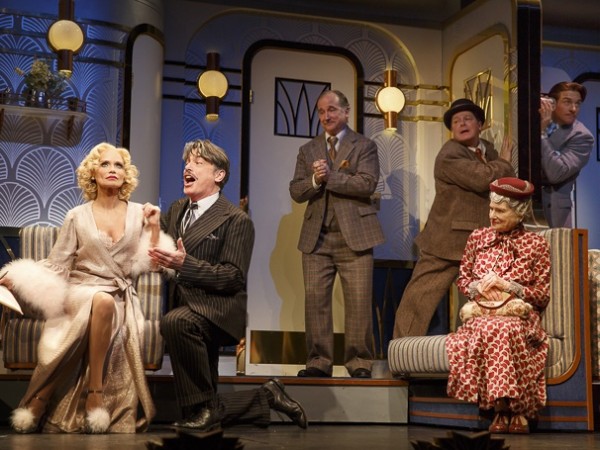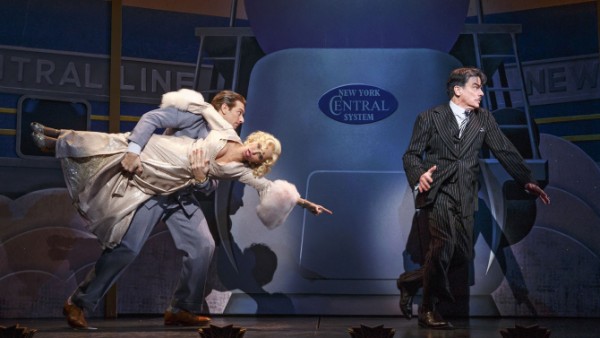
Oscar Jaffee (Peter Gallagher) is desperate for former flame Lily Garland (Kristin Chenoweth) to star in his next Broadway show (photo by Joan Marcus)
American Airlines Theatre
227 West 42nd St. between Broadway & Eighth Ave.
Tuesday – Sunday through January 4, $67-$142
212-719-1300
20thcenturyonbroadway.com
www.roundabouttheatre.org
“There’s something about a train that’s magic,” Richie Havens sang in a series of Amtrak commercials in the 1980s. There’s more than just a little magic in the first revival of Betty Comden, Adolph Green, and Cy Coleman’s 1978 screwball musical comedy, On the 20th Century, which has pulled into the American Airlines Theatre, brought back to glorious life by director Scott Ellis in this celebratory Roundabout production. It’s 1932, and suddenly bankrupt theatrical impresario Oscar Jaffee (Peter Gallagher), trying to recover from a series of failures, has boarded the glamorous Twentieth Century Limited with his musketeer henchmen, Oliver Webb (Mark Linn Baker) and Owen O’Malley (Michael McGrath), in order to convince his former leading lady, Lily Garland (Kristin Chenoweth), to put aside the Academy Award (aka the Oscar, of course) she’s just won and return to Broadway in his new show. But her new lover and frequent onscreen costar, Bruce Granit (Andy Karl), is jealous, and Lily herself is suspicious of the scheming Oscar, who discovered her when she was shlumpy Mildred Plotka and turned her into a star. Also on board the train is a little old lady, Mrs. Letitia Peabody Primrose (Mary Louise Wilson), a religious zealot secretly slapping up signs demanding that all of these heathens “Repent!” while also considering financing Oscar’s next show. As the train continues its overnight journey from Chicago to New York, Oscar grows more and more desperate, resulting in ever-wackier high jinks. “New York in sixteen hours / Anything can happen in those sixteen hours / On that might-y / Ride-the-night-ly / Miracle of engineering brains . . . / On the Twentieth Century / On the luxury liner of locomotive trains,” conductor Flanagan (Jim Walton) proclaims, and indeed, anything can and does occur.

Lily Garland (Kristin Chenoweth) finds herself in a bit of a triangle between Bruce Granit (Andy Karl) and Oscar Jaffee (Peter Gallagher) in Roundabout revival (photo by Joan Marcus)
The show has a storied history, adapted from Ben Hecht and Charles MacArthur’s 1932 play, Twentieth Century (itself based on Charles Bruce Millholland’s unproduced Napoleon of Broadway) and Howard Hawks’s 1934 film, 20th Century, which starred John Barrymore as Oscar and Carole Lombard as Lily. (Various other versions and iterations have featured Fredric March, John Cullum, Rock Hudson, Orson Welles, José Ferrer, and Alec Baldwin as Oscar and Madeline Kahn, Judy Kaye, Anne Heche, Lily Palmer, Constance Bennett, Gloria Swanson, and Betty Grable as Lily.) Tony nominee Gallagher (Guys and Dolls, Long Day’s Journey into Night) has just the right amount of smarm and charm as Oscar, even if his singing voice is not quite virtuosic (although he is dealing with an illness that has forced him to miss several performances and delayed the official opening by a week), but Tony winner Chenoweth (Wicked, You’re a Good Man, Charlie Brown) more than makes up for that in a role that she fully inhabits, giving a rafters-rattling performance that will knock your socks off, as if this were the role she was born to play. (In fact, in 2000, Green told Chenoweth, “You know what part you’re born to play?” To which Comden replied, “Lily Garland.”) When Oscar says about Mildred, “It was there. The pixie . . . the eternal woman . . . the fire . . . the passion . . . and the singing voice of a lost child heard by its mother echoing from beyond a corner,” it could just as well be Gallagher talking about Chenoweth. It’s a spectacular display that actually includes fireworks.
The operetta-like score is not particularly memorable, overloaded with repetition and redundancy, but three-time Tony nominee David Rockwell’s Art Deco sets are, along with six-time Tony nominee Ellis’s (The Elephant Man, 1776) gleefully chaotic staging and Tony winner Warren Carlyle’s (After Midnight) glittering choreography. Tony winner McGrath (Nice Work If You Can Get It, Spamalot) and Linn-Baker (You Can’t Take It with You, Perfect Strangers) are a kind of Harpo and Chico to Gallagher’s Groucho, while Tony nominee Karl (Rocky, The Mystery of Edwin Drood) chews up the scenery as the narcissistic Granit. It all makes for one joyous journey, even when things get too silly, but the show’s self-deprecating humor, knowing nods and winks, and endless magic make you overlook its shortcomings (while reveling in the irony that the show that takes place on board a train is playing in a theater named for an airline and is produced by a company whose title can refer to a circular intersection cars drive around). Throughout the show, characters keep knocking on Oscar’s door, waving their scripts in his face. “It’s all about life on a train / I call it ‘Life on a Train,’ Flanagan sings, continuing, “I put it down just as it happened / Oh, the things I’ve seen!” I can happily say the same thing about On the 20th Century, itself: Oh, the things I’ve seen!